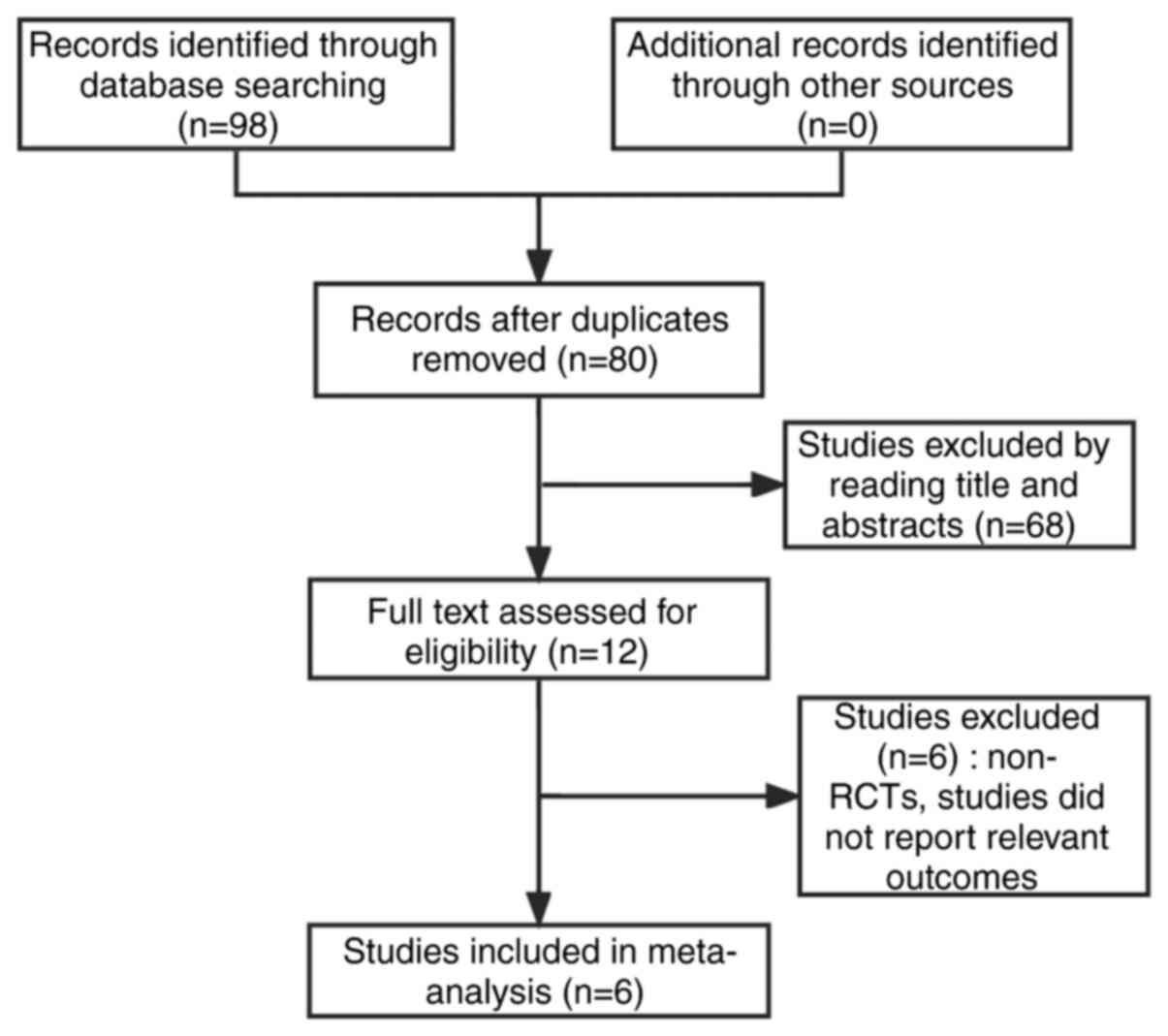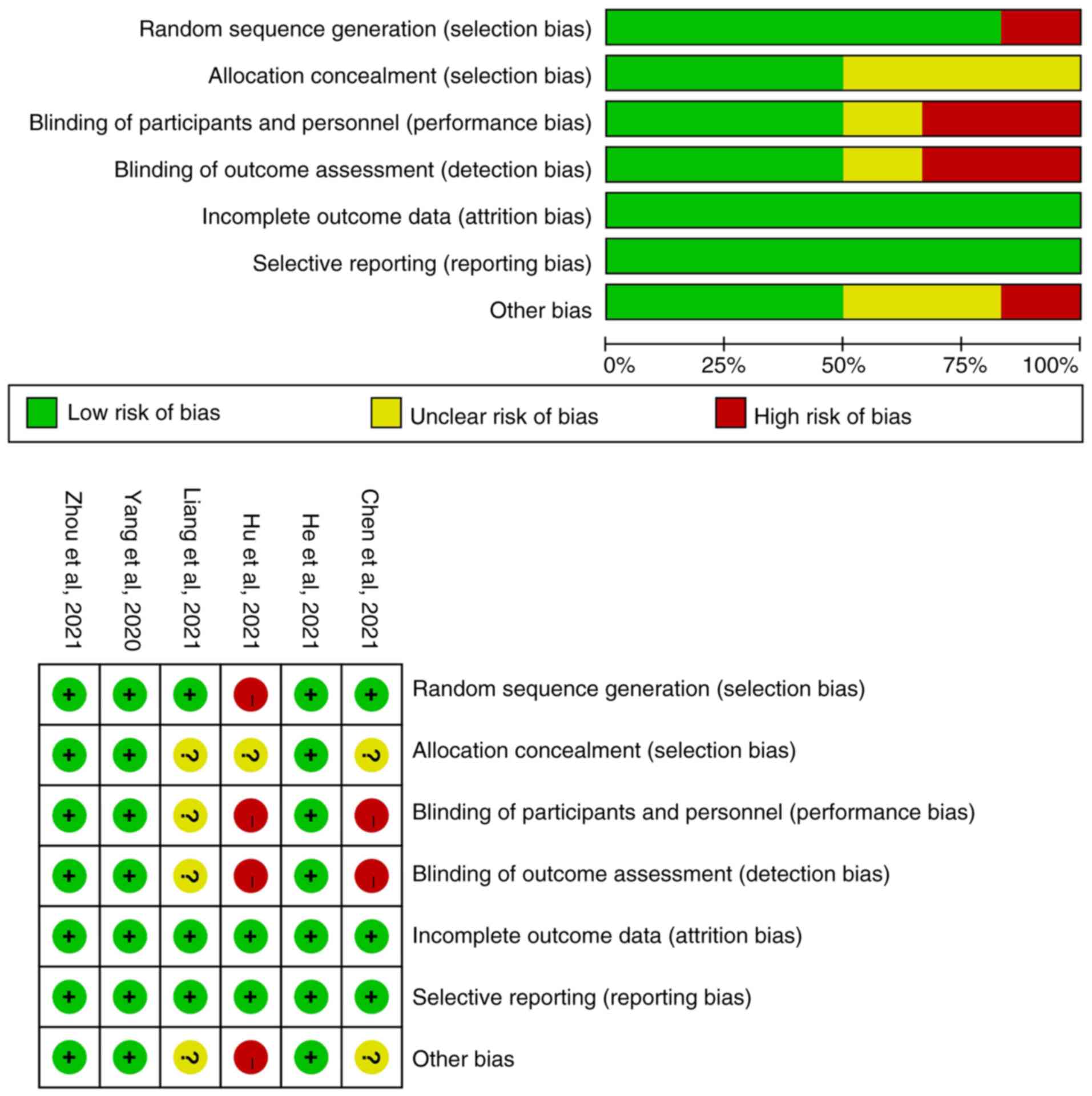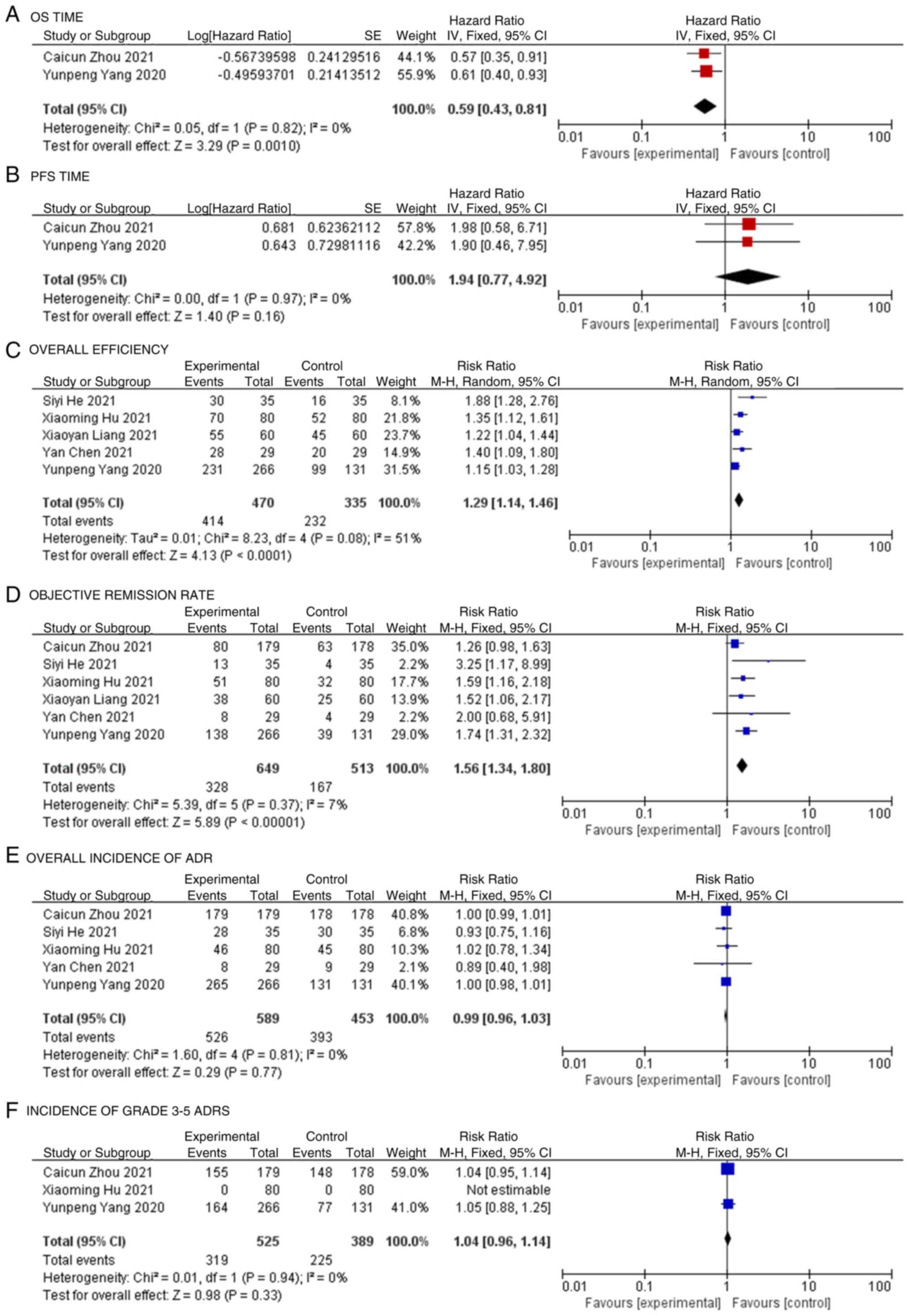|
1
|
Lan L, Zhao F, Cai Y, Wu RX and Meng Q:
Analysis of epidemiological characteristics of malignant tumor
mortality among Chinese residents in 2015. Zhonghua Liu Xing Bing
Xue Za Zhi. 39:32–34. 2018.(In Chinese). PubMed/NCBI
|
|
2
|
Chen WQ: Cancer statistics: Updated cancer
burden in China. Chin J Cancer Res. 27:12015. View Article : Google Scholar : PubMed/NCBI
|
|
3
|
Zhi XY, Zou XN, Hu M, Jiang Y, Jia MM and
Yang GH: Increased lung cancer mortality rates in the Chinese
population from 1973–1975 to 2004–2005: An adverse health effect
from exposure to smoking. Cancer. 121:3107–3112. 2015. View Article : Google Scholar : PubMed/NCBI
|
|
4
|
Shen G, Zheng F, Ren D, Du F, Dong Q, Wang
Z, Zhao F, Ahmad R and Zhao J: Anlotinib: A novel multitargeting
tyrosine kinase inhibitor in clinical development. J Hematol Oncol.
11:1202018. View Article : Google Scholar : PubMed/NCBI
|
|
5
|
Hida T, Nokihara H, Kondo M, Kim YH, Azuma
K, Seto T, Takiguchi Y, Nishio M, Yoshioka H, Imamura F, et al:
Alectinib versus crizotinib in patients with ALK-positive
non-small-cell lung cancer (J-ALEX): An open-label, randomised
phase 3 trial. Lancet. 390:29–39. 2017. View Article : Google Scholar : PubMed/NCBI
|
|
6
|
Mok TS, Wu YL, Ahn MJ, Garassino MC, Kim
HR, Ramalingam SS, Shepherd FA, He Y, Akamatsu H, Theelen WS, et
al: Osimertinib or platinum-pemetrexed in EGFR T790M-positive lung
cancer. N Engl J Med. 376:629–640. 2017. View Article : Google Scholar : PubMed/NCBI
|
|
7
|
Kong J, Yang X, Kong H, Yang MX and Xie
WP: Analysis of EGFR and ALK driving genes in 2394 patients with
lung adenocarcinoma. J Nanjing Med Univ (Natural Science).
40:675–680. 2020.(In Chinese).
|
|
8
|
Qiao XL, Ai D, Liang H, Mu D and Guo Q:
Analysis of gene expression and clinical characteristics of
molecular targeted therapy for non-small cell lung cancer in
Shandong. Zhongguo Fei Ai Za Zhi. 20:14–20. 2017.(In Chinese).
PubMed/NCBI
|
|
9
|
Dermani FK, Samadi P, Rahmani G, Kohlan AK
and Najafi R: PD-1/PD-L1 immune checkpoint: Potential target for
cancer therapy. J Cell Physiol. 234:1313–1325. 2019. View Article : Google Scholar : PubMed/NCBI
|
|
10
|
Leprieur EG, Dumenil C, Julie C, Giraud V,
Dumoulin J, Labrune S and Chinet T: Immunotherapy revolutionises
non-small-cell lung cancer therapy: Results, perspectives and new
challenges. Eur J Cancer. 78:16–23. 2017. View Article : Google Scholar : PubMed/NCBI
|
|
11
|
Sheng Z, Zhu X, Sun Y and Zhang Y: The
efficacy of anti-PD-1/PD-L1 therapy and its comparison with
EGFR-TKIs for advanced non-small-cell lung cancer. Oncotarget.
8:57826–5735. 2017. View Article : Google Scholar : PubMed/NCBI
|
|
12
|
Innovent Biologics: China's NMPA approves
Innovent's antipd-l antibody Tyvyt® (sintilimab
injection) for Hodgkins lymphoma [media release]. Innovent
Biologics (Suzhou) Co., Ltd.; Suzhou: 2018, http://innoventbio.com/en/#/news/123December
26–2018
|
|
13
|
Innovent Biologics, .
Tyvyt®(sintilimab): Chinese prescribing information.
Innovent Biologics (Suzhou) Co., Ltd.; Suzhou: 2019
|
|
14
|
Wang J, Fei K, Jing H, Wu Z, Wu W, Zhou S,
Ni H, Chen B, Xiong Y, Liu Y, et al: Durable blockade of PD-1
signaling links preclinical efficacy of sintilimab to its clinical
benefit. MAbs. 11:1443–1451. 2019. View Article : Google Scholar : PubMed/NCBI
|
|
15
|
Zhang L, Qian Y, Li J, Cui C, Chen L, Qu S
and Lu S: Indirect comparison of sintilimab and other PD-L1
inhibitors for first-line treatment of non-squamous non-small-cell
lung cancer. Future Oncol. 18:1896–1905. 2022. View Article : Google Scholar : PubMed/NCBI
|
|
16
|
Ye Z, Yang W, Xuan B, Li X, He J, Si H and
Ma W: Efficacy and safety evaluation of sintilimab for cancer
treatment: A systematic review and meta-analysis of randomized
controlled trials. Front Pharmacol. 13:8951872022. View Article : Google Scholar : PubMed/NCBI
|
|
17
|
National Cancer Institute, . Common
Terminology Criteria for Adverse Events (CTCAE) v4.0. NIH;
Bethesda, MD: 2009
|
|
18
|
Cumpston MS, McKenzie JE, Welch VA and
Brennan SE: Strengthening systematic reviews in public health:
Guidance in the cochrane handbook for systematic reviews of
interventions. (2nd edition). J Public Health (Oxf).
28:fdac0362022. View Article : Google Scholar
|
|
19
|
Yang Y, Wang Z, Fang J, Yu Q, Han B, Cang
S, Chen G, Mei X, Yang Z, Ma R, et al: Efficacy and safety of
sintilimab plus pemetrexed and platinum as first-line treatment for
locally advanced or metastatic nonsquamous NSCLC: A randomized,
double-blind, phase 3 study (Oncology pRogram by InnovENT
anti-PD-1-11). J Thorac Oncol. 15:1636–1646. 2020. View Article : Google Scholar : PubMed/NCBI
|
|
20
|
Zhou C, Wu L, Fan Y, Wang Z, Liu L, Chen
G, Zhang L, Huang D, Cang S, Yang Z, et al: Sintilimab plus
platinum and gemcitabine as first-line treatment for advanced or
metastatic squamous NSCLC: Results from a randomized, double-blind,
phase 3 trial (ORIENT-12). J Thorac Oncol. 16:1501–1511. 2021.
View Article : Google Scholar : PubMed/NCBI
|
|
21
|
Liang X and Wei Z: Effect of sintilimab
combined with chemotherapy on tumor markers and immune function of
advanced non-small-cell lung cancer. Pak J Med Sci. 37:1063–1068.
2021. View Article : Google Scholar : PubMed/NCBI
|
|
22
|
He SY, Zhang M, Xu Z, Lu XL, Chen ZP and
Zuo Y: Efficacy of sintilimab combined with chemotherapy in the
treatment of non-small cell lung cancer and its effect on immune
function. Chin Pract Med. 16:12–15. 2021.(In Chinese).
|
|
23
|
Hu XM, Li GY and Wang L: Clinical study of
gemcitabine combined with Sintilimab in the treatment of stage IV
lung squamous cell carcinoma. Chin J Clin Oncol Rehabilitation.
28:302–305. 2021.(In Chinese).
|
|
24
|
Chen Y, Liu W, Liang YH, Chen HF and Dong
ZH: Observation on the efficacy of Sintilimab combined with
amlotinib in the treatment of advanced non-small cell lung cancer.
J Guangdong Medical University. 39:615–618. 2021.
|
|
25
|
Ai C, Ji SS, Tang L, Wang L, Yan X and
Zhou MZ: Progress in antitumor clinical research of PD-1/PD-L1
inhibitors. Clin Med J. 19:62021.
|
|
26
|
National Comprehensive Cancer Network
(NCCN), . NCCN Clinical Practice Guidelines in Oncology: Non-small
cell lung cancer (version 1). NCCN; Plymouth Meeting, PA: 2021,
https://www.nccn.org/professionals/physician_gls/
|
|
27
|
Guidelines Working Committee of the
Chinese Society of Clinical Oncology, Chinese Society of Clinical
Oncology (CSCO), . Chinese Society of Clinical Oncology (CSCO):
Guidelines for the diagnosis and treatment of non-small cell lung
cancer 2020. People's Health Publishing House; Beijing, China: pp.
42021
|
|
28
|
Cai JX, Siying Chen SY, Jianping Qin JP,
Yue Zhang Y, Ruifeng Qi RF and Ye YM: Analysis of the efficacy and
safety of Sintilimab in the treatment of patients with advanced
colorectal cancer. Chin J Pharmacovigilance. 19:164–168. 2022.(In
Chinese).
|
|
29
|
Zhang L, Mai WQ, Jiang WY and Geng Q:
Sintilimab: A promising antitumor PD-1 antibody. Front Oncol.
10:5945582020. View Article : Google Scholar : PubMed/NCBI
|
|
30
|
Zhu D, Li YY, Song YQ and Li YJ: Clinical
research progress of PD-1 inhibitor Sintilimab. Chinese J Hospital
Pharmacy. 40:120–123. 2020.
|
|
31
|
Wang Y, Zhou S, Yang F, Qi X, Wang X, Guan
X, Shen C, Duma N, Aguilera JV, Chintakuntlawar A, et al:
Treatment-related adverse events of PD-1 and PD-L1 inhibitors in
clinical trials: A systematic review and meta-analysis. JAMA Oncol.
5:1008–1019. 2019. View Article : Google Scholar : PubMed/NCBI
|
|
32
|
Eigentler TK, Hassel JC, Berking C, Aberle
J, Bachmann O, Grünwald V, Kähler KC, Loquai C, Reinmuth N, Steins
M, et al: Diagnosis, monitoring and management of immune-related
adverse drug reactions of anti-PD-1 antibody therapy. Cancer Treat
Rev. 45:7–18. 2016. View Article : Google Scholar : PubMed/NCBI
|

















